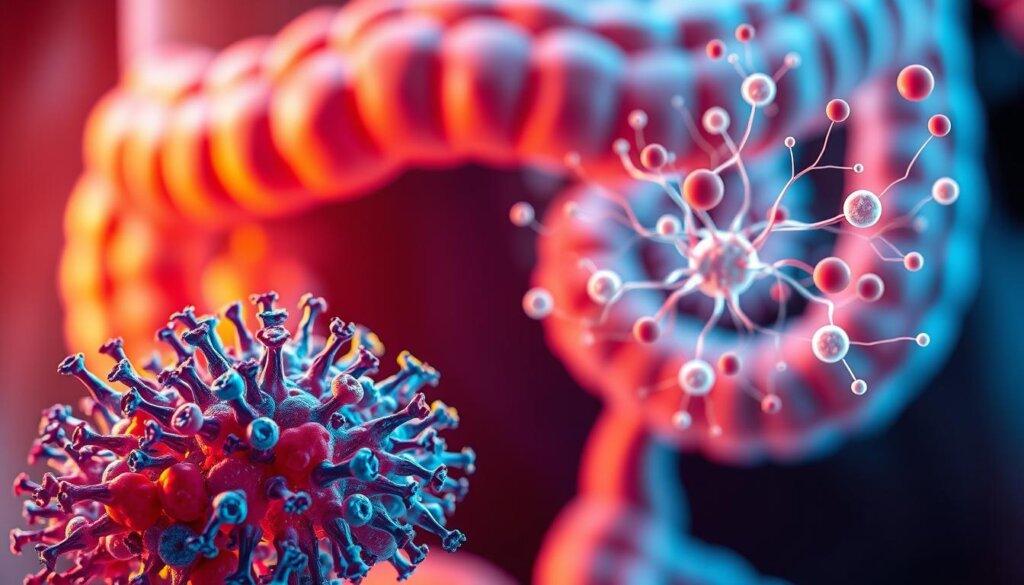What if your body’s initial response to probiotics isn’t a problem—but proof they’re working? Many individuals exploring gut health improvements notice mild shifts in digestion during their first weeks. These temporary adjustments often spark confusion, even though they’re typically harmless.
Probiotics contain live microorganisms that support a balanced gut environment. While most people adapt smoothly, some experience gas or bloating as beneficial bacteria establish themselves. These reactions usually fade within weeks, signaling the body’s adaptation process.
Individual responses vary based on gut microbiome diversity and overall wellness. A person’s diet, stress levels, and existing health conditions can influence how they feel during this transition. Recognizing typical patterns helps distinguish normal adjustments from rare concerns needing medical attention.
This guide clarifies what to anticipate, empowering readers to navigate their probiotic journey confidently. By understanding common temporary effects, individuals can make informed choices about supporting their digestive health effectively.
Key Takeaways
- Temporary digestive changes often signal probiotic effectiveness
- Reaction intensity varies by individual gut health profiles
- Most adjustments resolve within 2-4 weeks naturally
- Hydration supports smoother transitions
- Consult professionals if discomfort persists beyond 4 weeks
What Are Probiotics and Why They Matter
Discover the tiny heroes working behind the scenes in your digestive system. Probiotics are live microorganisms—mainly bacteria and yeasts—that help maintain balance in your gut. Think of them as friendly neighbors in your intestinal community, supporting everything from nutrient absorption to immune defenses.
Nature’s Gut Guardians
Your gut houses trillions of microbes forming a complex ecosystem called the gut microbiota. These beneficial bacteria aid digestion, produce vitamins, and even communicate with your brain. Common strains like Lactobacillus and Bifidobacterium act as frontline defenders against harmful invaders.
Foods vs. Supplements: Choosing Your Source
Fermented foods like yogurt, kimchi, and kombucha naturally contain probiotics. These traditional options offer diverse strains alongside nutrients like calcium and fiber. For targeted support, probiotic supplements provide concentrated doses of specific strains. They’re ideal for busy lifestyles or when dietary intake falls short.
Whether you prefer tangy kefir or convenient capsules, consistency matters. Pairing natural sources with high-quality supplements can optimize your gut’s microbial diversity. Remember, what works best depends on your unique needs and health goals.
Key Health Benefits of Probiotic Supplements
Your gut does more than digest food—it’s the cornerstone of overall wellness. High-quality probiotic supplements offer science-backed advantages that ripple through every system in your body. Let’s explore how these microbial allies elevate physical and immune functions.

Improved Digestion and Nutrient Absorption
These supplements act like skilled chefs in your digestive tract. They break down complex foods into easily absorbed nutrients. Research shows they enhance mineral uptake by up to 50% compared to diets without probiotic support.
A strengthened gut lining prevents undigested particles from leaking into the bloodstream. This protective effect reduces inflammation while improving how your body processes vitamins and medications. Many users report fewer bloating episodes and steadier energy levels.
“The gut’s ability to extract nutrients directly impacts cellular health throughout the body.”
Support for the Immune System
Your intestinal tract houses most of your infection-fighting cells. Probiotic strains stimulate antibody production while crowding out harmful pathogens. Studies indicate regular users experience 30% fewer respiratory infections annually.
These microbial helpers also regulate inflammatory responses. This dual action makes them valuable for managing conditions like IBS, as highlighted in health benefits of probiotics research. The table below compares natural sources versus supplements:
| Feature | Food Sources | Supplements |
|---|---|---|
| Strain Diversity | Limited | Targeted |
| CFU Count | Variable | Standardized |
| Convenience | Meal-Dependent | Daily Capsule |
From metabolic boosts to enhanced medication efficacy, these health benefits create lasting improvements. Pairing supplements with fermented foods creates a powerful synergy for Malaysian lifestyles.
Common symptoms after taking probiotics
Starting a probiotic routine often brings subtle changes as your gut adapts. Many people notice temporary gas or bloating—natural signs of beneficial microbes colonizing the digestive tract. These effects typically peak within the first week before subsiding.
Digestive shifts vary by probiotic type. Bacteria-based strains may trigger mild bloating, while yeast-based options sometimes lead to constipation. A small percentage report brief skin flare-ups or muscle discomfort as their immune system recalibrates.
Key temporary reactions include:
- Increased gas production during microbial balance shifts
- Altered bowel patterns lasting 3-7 days
- Occasional thirst changes with specific strains
These side effects usually resolve within 2-3 weeks as the body adjusts. Persistent issues beyond a month might indicate signs of probiotic deficiency or imbalance requiring professional guidance.
Most people find their system adapts smoothly when staying hydrated and gradually increasing doses. Remember—these temporary changes often signal your gut environment is actively improving.
How Probiotics Interact with the Digestive and Immune Systems
Probiotics act as skilled negotiators between your gut and immune defenses. These beneficial bacteria create a ripple effect that reaches far beyond digestion. Their work supports critical functions while maintaining harmony across bodily systems.

Effects on Gut Health
Your intestinal lining becomes a battleground where good microbes outcompete harmful invaders. Probiotic strains occupy space and resources, leaving less room for pathogens. This natural crowding effect strengthens the gut barrier through three key actions:
| Mechanism | Benefit | Result |
|---|---|---|
| Microbial Competition | Reduces pathogen colonization | Fewer infections |
| Mucus Production | Strengthens intestinal wall | Improved nutrient absorption |
| Antimicrobial Secretion | Neutralizes threats | Balanced microbiome |
Impact on Systemic Immunity
Nearly 70% of immune cells reside in gut-associated lymphoid tissue. Probiotics train these cells to distinguish friend from foe. They regulate cytokine production, preventing excessive inflammation linked to chronic conditions.
“The gut-immune partnership determines how our bodies respond to everything from seasonal allergies to autoimmune challenges.”
Emerging research reveals connections between gut microbes and brain function. This gut-brain axis explains why some probiotic for gastritis formulations also support mental clarity. By maintaining microbial balance, these supplements help multiple systems work in concert.
Potential Side Effects and How to Handle Them
New probiotic users often wonder how to recognize normal adjustment signals. While most reactions are mild, understanding management strategies ensures a smoother transition. Simple tweaks to your routine can make all the difference.
Smart Strategies for Initial Adjustments
Starting with a low dose helps your gut adapt gradually. Research shows this approach reduces initial side effects by 40% compared to full-strength regimens. Increase amounts slowly over 2-3 weeks as your system acclimates.
| Approach | Benefit | Tip |
|---|---|---|
| Low Initial Dose | Reduces gas/bloating | Increase 25% weekly |
| Hydration Focus | Supports toxin removal | 8 glasses daily minimum |
| Quality Selection | Minimizes reactions | Look for CFU guarantees |
Timing matters—take supplements 30 minutes before meals for better absorption. If effects persist beyond 14 days, reduce your dose by half or pause temporarily. Always consult healthcare providers when reactions feel concerning.
Water intake proves crucial during adjustment phases. Proper hydration helps beneficial bacteria establish themselves while flushing out digestive byproducts. Pair this with stress management techniques for enhanced results.
“Listen to your body’s signals—they’re guideposts, not roadblocks.”
High-quality formulas from trusted brands lower side effects risks significantly. Check for third-party testing certifications and strain specificity matching your health goals. Remember—temporary effects often indicate positive microbial shifts.
Considerations for Special Populations and Allergies
While probiotics benefit many people, certain groups need tailored approaches. Understanding individual health circumstances helps maximize safety and effectiveness.
Risk Factors for Compromised Immune Systems
Those with compromised immune systems face unique challenges. Medical treatments like chemotherapy or immunosuppressive drugs reduce the body’s ability to manage microbial balance. This increases risk of rare but serious infections from probiotic strains.
Key populations requiring caution include:
- Post-surgery patients with healing incisions
- Individuals using venous catheters long-term
- People hospitalized for extended periods
Ingredient Sensitivities and Allergens
Many supplements contain hidden triggers for sensitive individuals. Common culprits in probiotic foods and capsules include:
| Allergen | Common Sources | Alternative Options |
|---|---|---|
| Dairy | Yogurt-based formulas | Dairy-free strains |
| Soy | Fermented soy products | Legume-free capsules |
| Gluten | Binding agents | Certified GF brands |
“Always cross-check labels with your known sensitivities. When in doubt, consult a nutrition specialist familiar with your medical history.”
Those managing chronic conditions like acute pancreatitis should avoid probiotics entirely. For others, selecting hypoallergenic strains and verifying manufacturing practices reduces reaction risk.
Expert Guidance and Safe Usage Tips in Malaysia
Navigating probiotic choices becomes easier with trusted local expertise. Malaysian health seekers can optimize results by pairing quality supplements with personalized advice. This approach helps avoid common pitfalls while tailoring routines to individual needs.
Connecting with Wellness Group
The Wellness Group offers science-backed consultations for those starting their gut health journey. Their specialists help match probiotic supplement strains to specific goals, whether improving digestion or supporting immunity. Clients receive customized plans integrating supplements with local food favorites like tempeh or fresh yogurt.
Business Hours and Contact Information
Reach their team weekdays 9 AM-6 PM via WhatsApp at +60123822655. Weekend inquiries receive responses within 24 hours. Many find it helpful to consult before they start taking new products, especially when managing sensitive systems.
Pairing professional guidance with gradual changes yields the best outcomes. Those with irritable bowel concerns particularly benefit from phased introductions. Remember—a balanced diet enhances any supplement regimen, creating lasting wellness foundations.
FAQ
What are probiotics, and how do they support gut health?
Probiotics are live microorganisms that help balance gut bacteria. They aid digestion, break down food, and may reduce bloating or irregular bowel movements. Common sources include yogurt, kefir, and supplements.
Can probiotic supplements cause temporary discomfort?
Some people experience mild gas or bloating when first using these supplements. This usually subsides as the body adjusts. Starting with a low dose and gradually increasing it can ease this transition.
Are there risks for those with weakened immune systems?
Individuals with compromised immunity should consult a healthcare provider before trying probiotics. Certain strains might pose infection risks in rare cases, especially for those undergoing treatments like chemotherapy.
How do fermented foods compare to probiotic supplements?
Fermented foods like kimchi or sauerkraut naturally contain beneficial bacteria. Supplements offer specific strains in higher concentrations, making them useful for targeting issues like irritable bowel syndrome.
What benefits do probiotics provide beyond digestion?
Research suggests they may strengthen the immune system by crowding out harmful pathogens. Some strains also produce vitamins or support mental health through the gut-brain connection.
How can someone in Malaysia get personalized advice on probiotics?
Wellness Group Malaysia offers expert guidance. Contact them via WhatsApp at +60123822655 during business hours for tailored recommendations based on individual health needs.






